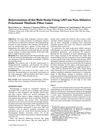71 citations,
May 2006 in “The journal of investigative dermatology/Journal of investigative dermatology” TTD hair brittleness is caused by multiple structural abnormalities.
7 citations,
October 2011 in “BMC Cancer” Overexpression of HDGF in melanocytes does not cause cancer.
99 citations,
May 1998 in “Journal of biological chemistry/The Journal of biological chemistry” Small proline-rich proteins and trichohyalin help make epithelial tissues tougher and more flexible.
 2 citations,
August 2022 in “Reproductive Biology and Endocrinology”
2 citations,
August 2022 in “Reproductive Biology and Endocrinology” Magnesium supplements improved quality of life for women with polycystic ovary syndrome, but didn't help with acne, hair loss, or abnormal bleeding.
 5 citations,
September 2012 in “Journal of Investigative Dermatology”
5 citations,
September 2012 in “Journal of Investigative Dermatology” Scientists can mimic hair disorders by altering genes in lab-grown human hair follicles, but these follicles lack some features of natural ones.
 126 citations,
January 2009 in “International Journal of Trichology”
126 citations,
January 2009 in “International Journal of Trichology” Oxidative stress contributes to hair graying and loss as we age.
 49 citations,
January 2003 in “American Journal of Clinical Dermatology”
49 citations,
January 2003 in “American Journal of Clinical Dermatology” Effective management of children's hair loss involves accurate diagnosis, various treatments, and supportive care.
139 citations,
October 2005 in “Journal of Investigative Dermatology” The nail matrix has a reduced immune response, protecting it from autoimmunity.
90 citations,
February 2000 in “Dermatologic Surgery” Alexandrite laser hair removal is safe for darker skin tones.
 4 citations,
January 2023 in “Experimental dermatology”
4 citations,
January 2023 in “Experimental dermatology” Skin thickness decreases and structural changes occur with both ageing and sun exposure in certain skin types.
18 citations,
April 1989 in “Clinics in Dermatology” The argon gas-based cryotherapy effectively reduced keloid scars but caused some hypopigmentation and had a recurrence rate, especially in Afro-American patients.
11 citations,
March 2012 in “Journal of the American Academy of Dermatology” Most patients with dark skin were satisfied with laser hair removal and had few complications.
 9 citations,
May 2005 in “Facial plastic surgery”
9 citations,
May 2005 in “Facial plastic surgery” Laser hair removal can be safe and effective for dark-skinned individuals with the right laser settings.
 April 2021 in “Journal of Investigative Dermatology”
April 2021 in “Journal of Investigative Dermatology” Photobiomodulation therapy may help treat hair loss in people with darker skin, but more research is needed.
January 2015 in “Journal of cosmetics, dermatological sciences and applications” The combined technology safely and effectively removes hair at home on dark skin.
September 2022 in “Journal of The American Academy of Dermatology” More research is needed to understand how skin type affects laser treatment for hair loss.
20 citations,
November 2014 in “JAMA dermatology” The 810-nm diode laser improves skin texture in keratosis pilaris but not redness.
 15 citations,
January 2003 in “Lasers in Surgery and Medicine”
15 citations,
January 2003 in “Lasers in Surgery and Medicine” Cold air and a chilled sapphire window both protect the skin during laser treatments, and work better with water or gel, especially for darker skin.
7 citations,
April 2006 in “Lasers in medical science” Acneform reactions after laser hair removal occur in 6% of cases, mostly mild and short-lived, with higher risk in younger patients, those treated with Nd:YAG laser, and individuals with darker skin.

Children with alopecia areata often have low vitamin D, especially if they have darker skin, it's not summer, or they're not White.
Fractional laser resurfacing is effective for skin conditions, has lasting results, quick recovery, and is safe but requires careful consideration of risks.
 15 citations,
January 2017 in “Lasers in Surgery and Medicine”
15 citations,
January 2017 in “Lasers in Surgery and Medicine” Laser treatment improved scalp skin condition with no side effects.
 October 2023 in “CRC Press eBooks”
October 2023 in “CRC Press eBooks” Children with darker skin can have various hair and nail issues.
10 citations,
November 2017 in “Dermatologic clinics” Men of different ethnicities are more often getting cosmetic treatments, and doctors should consider their specific skin types and cultural standards.
85 citations,
June 1999 in “Dermatologic Surgery” The long-pulsed alexandrite laser is safe and effective for hair reduction.
 15 citations,
February 2014 in “BMC Research Notes”
15 citations,
February 2014 in “BMC Research Notes” The X5 Hairlaser might help treat male hair loss, but more research is needed.
 May 2023 in “Elsevier eBooks”
May 2023 in “Elsevier eBooks” Low-level laser/light therapy is effective and safe for mild to moderate hair loss in men and women when combined with other treatments.
April 2023 in “Journal of Investigative Dermatology” In-person laser treatments help hair growth in androgenetic alopecia.
 9 citations,
March 2005 in “Aesthetic surgery journal”
9 citations,
March 2005 in “Aesthetic surgery journal” The long-pulse alexandrite laser effectively removes hair permanently.
 8 citations,
October 2018 in “Journal of the European Academy of Dermatology and Venereology”
8 citations,
October 2018 in “Journal of the European Academy of Dermatology and Venereology” Mohs micrographic surgery is effective for early-stage non-melanoma skin cancers on the lips, with basal cell carcinoma more common on the upper cutaneous lip and squamous cell carcinoma more common on the lower vermilion lip.














